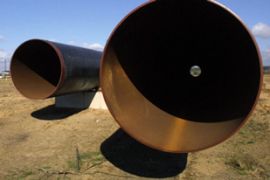Russia cuts gas supply to Ukraine
Russia cuts gas supplies to Ukraine after talks on back-payments and price fail.

Alexander Medvedev, Gazprom’s deputy chairman, said the threat – contained in a letter from Naftogaz – amounted to “blackmail” of Russia and the European Union and was “utterly irresponsible”.
Gazprom supplies a quarter of the gas used by EU nations, with around 80 per cent of it passing through Ukraine.
The move has raised fears of a disruption in supplies to Europe similar to those seen in January 2006.
Ukrainian stockpiles
Neave Barker, Al Jazeera’s correspondent in Moscow, said: “Ukraine says it has learned from a similar gas dispute with Russia three years ago and now has enough stockpiles to last a few months.
“But Kiev is finding itself under pressure from the West not to threaten European supplies as Russia continues to demand all expenses be paid”.
Vladimir Putin, Russia’s prime minister, warned Ukraine against diverting gas intended for other customers, saying it could have “quite serious consequences for the transit country itself” by damaging relations with Europe.
Paying the debt, plus a proposed Russian increase in tariffs, is likely to prove extremely difficult for Ukraine which was recently forced to seek $14.5bn in aid from the International Monetary Fund.
In addition to the global financial crisis, the country is also suffering from political turmoil amid a long-standing feud between Victor Yushchenko, Ukraine’s president and Yulia Timoshenko, the country’s prime minister.
Some media reports suggested that Timoshenko may go to Moscow for talks to resolve the gas dispute.
Russia’s ties with its former Soviet neighbour are already badly strained over Ukraine’s aspirations to join Nato and Kiev’s support for Georgia in its August war with Russia.
Ukraine currently pays Russia $179.5 for 1,000 cubic metres of gas but Gazprom has warned that prices could rise to $400 in 2009.